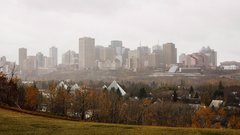Oct 15, 2019
2019 federal election platform tracker: Where the major parties stand so far
The Strategists: NDP and Bloc worth watching as kingmakers of minority government
Canadian voters will head to the polls on Oct. 21 after what is expected to be a heated federal election campaign.
Jon Erlichman and Greg Bonnell will kick off BNN Bloomberg’s special coverage with ELECTION 2019 at 5 p.m. ET/2 p.m. PT. They’ll be joined by a range of prominent investors and business leaders including PIMCO's Ed Devlin, Mattamy Homes' Peter Gilgan, OMX's Nicole Verkindt, Martinrea's Rob Wildeboer, and former TransCanada CEO Hal Kvisle.
From 7 p.m. ET/ 4 p.m. PT onward, BNN Bloomberg will air the CTV ELECTION 2019 special and stream it on BNNBloomberg.ca.
Here’s a look at what each of the parties have promised so far on the major issues affecting the economy, business and your finances. BNN Bloomberg will keep this platform guide updated as more details are announced.
Latest update: Oct. 21, 2019
JUMP TO AN ISSUE
FISCAL PLAN
Bloc Quebecois
- No specific proposals to date
Conservatives
- Balance the budget in five years by taking a “measured approach to spending growth”
- Deficit would peak at $23 billion in 2020, before dropping to $5 billion in 2023, moving into a surplus in 2024.
- Cut consultant costs, scale back travel and hospitality, and sell federal real estate to downsize government spending. The party estimates savings will reach $5 billion in the fifth year of the plan.
Greens
Liberals
- Make new investments amounting to $9.3 billion in 2020-21, rising to $17 billion by 2023-24
- Increase the deficit to $27.4 billion next year before reducing it to $21 billion by 2023-24
- Lower the debt-to-GDP ratio to 30.2 per cent by 2023, from 30.9 per cent in 2020-21
- Preserve Canada’s AAA credit rating
NDP
- Run a deficit of $32.7 billion in 2020-21 (including a contingency fund) before lowering it to $16.6 billion in 2023-24.
- Says debt-to-GDP ratio (including contingency fund) would fall to 30 per cent by 2023-24 from 31.3 per cent in 2020-21.
People’s Party of Canada
- Balance the budget within two years
HOUSING
Bloc Quebecois
- Wants more funding for social and affordable housing in Quebec
Conservatives
- Propose changing mortgage stress tests for first-time homebuyers and reviewing the removal of the test from mortgage renewals
- Increase amortization periods on insured mortgages to 30 years for first-time buyers
- Launch an inquiry into money laundering in real estate
- Make federal real estate available for housing developments
Greens
- Legislate housing as a legally protected fundamental human right for all Canadians and permanent residents
- Appoint a Minister of Housing to strengthen the National Housing Strategy so it meets the needs of affordable housing in each province
- Eliminate the first-time home buyer incentive recently implemented by the Liberals
- Restore tax incentives for building purpose-built rental housing and provide tax credits for gifts of lands to community land trusts to provide affordable housing
- Refocus the Canada Mortgage and Housing Corporation’s mandate on supporting the development of affordable, non-market and cooperative housing, as opposed to one of its primary activities of providing mortgage loan insurance
Liberals
- Introduce federal speculation tax on non-residents and a higher cap on the First-Time Home Buyer Incentive, which was implemented in early September.
- Increased the amount first-time buyers can withdraw from their RRSPs to $35,000 from $25,000 in budget 2019.
NDP
- Spend $5 billion building 500,000 affordable homes
- Allocate $125 million each year to removing GST from the construction of new rental units
- Re-introduce 30-year terms for insured mortgages for first-time homebuyers
- Double the first-time homebuyers’ tax credit to $1,500
- Implement a 15 per cent foreign buyers' tax on purchases of residential property by foreign corporations or people who are not citizens or permanent residents
- Work with provinces to create a public beneficial ownership registry to increase transparency about who owns properties in an effort to stop money laundering
- Offer up to $5,000 in rental subsidies for nearly 500,000 families struggling to pay for housing
People’s Party of Canada
- No specific pledges to date
SUPPLY MANAGEMENT
Bloc Quebecois
- Introduce a bill to protect supply management in future trade agreements
Conservatives
- Scheer has expressed support for supply management
Greens
- Protect supply management and ensure that products that are banned in Canada are not imported in food from other countries
Liberals
- Support supply management, which became a sticking point in the new North American Free Trade Agreement talks. Canadian negotiators ultimately conceded, and under the new pact, which has yet to be ratified by all three countries’ lawmakers, Americans will be allowed to ship more milk to Canada’s protected dairy market.
- Trudeau has pledged $1.75 billion over eight years to compensate dairy farmers affected by free trade agreements with Europe and countries on the Pacific Rim. The Liberals have promised a similar program when the Canada-United States-Mexico Agreement comes into force.
NDP
- Vows to protect supply management
People’s Party of Canada
- Phase out supply management over a number of years
- Allow Canada’s dairy, egg and poultry farmers to sell their products internationally
PERSONAL TAXES
Bloc Quebecois
- Wants Revenu Québec to collect federal income taxes, rather than the Canada Revenue Agency, so that Quebeckers only have to file one return
Conservatives
- Boost the Adoption Expense Tax Credit to $20,000 and make it fully refundable
- Gradually reduce taxes on the lowest income bracket to 13.75 per cent from 15 per cent
- Re-introduce the Children’s Fitness Tax Credit and Children’s Arts and Learning Tax Credit. The credits would allow parents to claim up to $1,000 per child for expenses related to sports and fitness classes and up to $5,000 per child for expenses related to arts and educational activities
- Re-introduce a 15-per-cent tax credit for public transit passes
- Remove federal income tax from Employment Insurance maternity and paternity benefits by providing a 15-per-cent tax credit for any income under the two programs
- Eliminate GST from home heating and energy bills
- Establish a single tax return for Quebec residents
- Introduce a 20 per cent refundable tax credit for anyone who spends between $1,000 and $20,000 on energy-saving home renovations
- Improve access to the federal disability tax credit by reducing the required number of hours spent on managing a disability, and expand the types of activities that can qualify
- Expand a tax credit on supplies for volunteer firefighters, and search and rescue workers, by lowering the number of required service hours from 200 hours a year to 150 for eligibility
Greens
- Close tax loopholes that benefit the wealthy, such as ones on executive stock options and capital gains
Liberals
- Cap employee stock option deductions for high-income earners in large and mature companies to $200,000 annually (as per 2019 budget)
- Raise basic personal amount to $15,000
- Introduce a 10-per-cent tax on luxury cars, boats, and personal aircraft valued at $100,000 or more
NDP
- Expects $5.6 billion in revenue in 2020-21 from the “super-wealth tax” that applies a one-per-cent tax to those worth over $20 million
- Sees eventual $709-million revenue gain from a 12-per-cent luxury tax on aircraft, boats, and vehicles valued over $100,000
- Sees $8 billion in revenue in 2020-21 by raising capital gains rate to year 2000 levels
- Increase the amount of investment profits subject to capital gains taxation to 75 per cent, the rate that was in place in 2000, from 50 per cent
- For Canadians making over $210,000, will increase the top marginal tax rate by two points to 35 per cent, raising over half a billion dollars annually.
People’s Party of Canada
- Abolish the capital gains tax
- Cut the federal tax to 15 per cent on income between $15,001 and $100,000, and 25 per cent tax rate on income above $100,000
CORPORATE TAXES
Bloc Quebecois
- Require global technology giants to pay a three-per-cent tax on Canadian revenue, similar to that in France
- Crack down on large corporations’ use of tax havens by reviewing the Canada Revenue Agency’s role and the country’s tax agreements with such jurisdictions
Conservatives
- Remove some of the subsidies given to businesses in an effort to save $1.5 billion in costs
- Tax large tech companies that host social media platforms, search engines, or online marketplaces. The levy would apply to companies that have worldwide revenues over $1 billion and revenues in Canada over $50 million with a three-per-cent tax on revenues. The party estimates $2.5 billion in revenue over five years.
Greens
- End offshore tax dodging by taxing funds hidden in offshore havens and requiring companies to prove that foreign affiliates are actual functioning businesses
- Apply a corporate tax on transnational e-commerce firms doing business in Canada by requiring the foreign vendor to register, collect and remit taxes where the product or service is consumed
- Eliminate all fossil fuel subsidies, including payments and tax write-offs, including the accelerated capital cost allowance on liquefied natural gas and tax write-offs for oil and gas wells
- Increase the federal corporate tax rate from 15 to 21 per cent
- Charge a five-per-cent surtax on commercial bank profits. Credit unions, caisses populaires and co-ops would be exempt
- Implement a “robot tax” that companies would have to pay every time they replace a worker with a machine. The revenue would be used to fund educational and retraining programs for workers
Liberals
- Ensure multinational tech giants pay corporate tax on revenue they generate in Canada. This proposal would introduce a three-per-cent income tax on businesses in certain sectors of the digital economy with worldwide revenues of at least $1 billion and Canadian revenues of more than $40 million, beginning on April 1, 2020.
- Cut in half corporate taxes for businesses that develop technologies or manufacture products that produce zero emissions
NDP
- Will roll corporate tax cuts back to 18 per cent (2010 levels) while maintaining the small business tax rate at its current level
- Expects $2.3 billion in revenue from taxing large internet giants such as Netflix and Google on digital services and advertising
- Sees $46 million in revenue in 2020-21 from eliminating stock option loopholes
People’s Party of Canada
- Lower corporate income tax rate to 10 per cent from 15 per cent
- End corporate welfare
- Expand the Accelerated Capital Cost Allowance program to all sectors
JOBS AND ECONOMY
Bloc Quebecois
- Implement measures to protect Quebec jobs and corporations from foreign takeovers
- Launch an investment fund aimed at promoting the province’s high-tech sectors such as gaming, green technology, aerospace and pharamceutical
- Offer a remediation agreement with SNC-Lavalin
- Establish a tax credit for young graduates who move to Quebec, matching an existing provincial credit
- Transfer responsibility for the foreign workers program from Ottawa to Quebec
- Establish incentives to hire Aboriginal workers
- Establish loans and loan guarantee programs for companies looking to automate in the face of labour shortages
- Plan to consult with unions and socio-economic groups on adjusted taxation and reduced tax rate for overtime work
Conservatives
- Appoint a Quebec Minister of Canada Economic Development and a political minister from Quebec
- Launch a judicial inquiry into the Liberal government’s involvement in SNC-Lavalin’s criminal prosecution
- Shelve the Canada Infrastructure Bank, which the Liberals gave $35 billion in funding to over 10 years to finance infrastructure projects. Instead, the Conservatives promise to prioritize spending on projects that reduce commute times
- Spend $187 billion on infrastructure investments over 15 years instead of the 12 years currently promised by the Liberals.
Greens
- Develop a Sustainable Generations Fund to invest in green trades and apprenticeship training, as well as education facilities
- Enhance the Youth Employment and Skills Strategy by creating a Community and Environment Service Corps. that will provide $1 billion annually to municipalities to hire Canadian youth
- Study the impact of adopting a shorter work week
- Ban unpaid internships in private sector workplaces
- Raise the federal minimum wage to $15 per hour
- Implement a “robot tax” that companies would have to pay every time they replace a worker with a machine. The revenue would be used to fund educational and retraining programs for workers
Liberals
- Extend EI sickness benefits from 15 to 26 weeks at a cost of $507 million by 2023-24; implement a new Career Insurance Benefit for people who have worked continuously for the same employer for five or more years, and are laid off when the business closes
- Aim to award at least five per cent of federal contracts to businesses led by Indigenous Peoples
- Add an additional $9 million over three years to help more visible minority newcomer women find work
NDP
- Ensure part-time and contract workers are compensated equally to full-time workers
- Establish a federal minimum wage of $15 per hour
- Ban unpaid internships outside of education programs
- Replace the troubled Phoenix pay system for federal government employees
- Create a National Automotive Strategy with all levels of government and industry leaders to help retain jobs and attract investment.
- Restore the Automotive Innovation Fund and prioritize made-in-Canada vehicles.
- Give Export Development Canada a stronger mandate.
People’s Party of Canada
- Limit the number of temporary foreign workers
- Privatize Canada Post
- Privatize airports
ENERGY AND ENVIRONMENT
Bloc Quebecois
- Promises to end fossil fuel subsidies
- Committed to meeting the Paris Agreement targets on climate change, and has goals to exceed them
- The party is against the proposed Energy East pipeline that would have run through Quebec, and wants to have a veto over any pipeline that would need to go through the province
Conservatives
- Repeal Bill C-69, which overhauls the review process for resource projects in Canada
- End Bill C-48, which bans oil tankers that are carrying more than 12 500 metric tons of crude oil along northern British Columbia
- Enact legislation to clarify roles of proponents and governments in consultations
- End foreign-funded interference in regulatory hearings
- Provide certainty on approval timelines and schedules
- Eliminate the Trudeau government’s carbon tax
- Introduce a 20 per cent refundable tax credit for anyone who spends between $1,000 and $20,000 on energy-saving home renovations
- Create a national energy corridor that would carry oil, gas, hydroelectricity and telecommunications from coast-to-coast. The Conservatives say the plan would help the federal government address environmental concerns upfront, increase investor certainty and help get critical projects built
Greens
- Upgrade Canada Post’s fleet to electric vehicles
- Broaden postal carriers’ mandate to check in on those who live alone or have mobility issues, particularly during extreme weather events
- Reduce greenhouse gas emissions by 60 per cent by 2030 and to zero by 2050
- Cancel the Trans Mountain pipeline expansion
- Make electric vehicles affordable, expand charging stations and ban the purchase of new internal combustion engine vehicles by 2030
- Mandate energy retrofits for all buildings by 2030
- Regulate the CPP Investment Board to require divestment of coal, oil and gas shares
Liberals
- Get Canada to net zero emissions by 2050
- Spend $150 million by fiscal 2023-24 to give one-fourth of land and ocean waters protected status and expand the Learn to Camp program, which gives travel bursaries to lower-income families to spend up to four nights in one of Canada's national or provincial parks
- Cut taxes in half for companies that develop zero-emissions technology
- Give homeowners and landlords an interest-free loan of up to $40,000 to help retrofit 1.5 million houses so they are more energy efficient
- Spend $100 million in skills training for workers to conduct energy audits, retrofits and net-zero home construction
- Create a national flood insurance program and develop employment insurance benefits for those struck by natural disasters
- Ban single-use plastics by 2021
- Offer new incentives to buy electric cars, including up to $5,000 on new vehicles under $45,000 (as per budget 2019)
- Plant two billion trees over the next decade, which the Liberals say will create 3,500 seasonal jobs, as part of a $3-billion plan to fight climate change
- Invest the expected $500 million in corporate tax revenue from the Trans Mountain pipeline expansion project into natural climate solutions and clean energy projects
- Launch an Employment Insurance Disaster Assistance Benefit in 2021 at a cost of $100 million to help households who have been impacted by a federally-declared disaster
- Invest $1 billion over the next decade into the Disaster Mitigation and Adaption Fund
NDP
- Create a publicly-funded "climate bank" to increase clean energy investments
- Build an east-west corridor to carry clean energy across Canada
- Expand federal funding by $2.5 billion for diaster relief and adapting infrastructure to withstand extreme weather events
- Introduce federal incentives for zero-emissions automobiles
- Electrify transit and other municipal fleets by 2030.
- Power Canada with net carbon-free electricity by 2030 and move to 100 per cent non-emitting electricity by 2050
- Ban single-use plastics.
- Continue carbon pricing, including rebates to households that fall under the federal backstop plan; roll back the breaks to big polluters
- Create a $40-million Coastal Protection Fund to defend wild salmon, remove derelict vessels, clean up the coast, and improve Coast Guard equipment and training
- Allocate $1.5 billion for green transit and transportation spending each year
- Generate $611 million in revenue in 2020-21 from eliminating fossil fuel subsidies
People's Party of Canada
- Find a private buyer for the Trans Mountain pipeline expansion project
- Repeal Bill C-48 and Bill C-69
- Scrap the federal carbon tax
- Withdraw from the Paris Accord, an international agreement to fight climate change signed in 2016
- Remove subsidies for green technology
TRADE
Bloc Quebecois
- Has criticized the new NAFTA, CETA and TPP for its impact on Quebec’s producers. The party has said it will introduce a bill to protect supply management in future trade agreements
Conservatives
- Work with provinces to implement an Interprovincial Free Trade Agreement (IFTA)
- Appoint a Minister of Interprovincial Trade, who would be responsible for leading negotiations and implementing the IFTA
Greens
- Revamp national trade policy to align with national and international climate change plans
- Renegotiate Canada’s trade and investment agreements to remove the Investor State Dispute Settlement (ISDS) provisions that give foreign firms the ability to challenge government laws and policies
Liberals
- Create a Canada Free Trade Tribunal to help resolve cases involving domestic trade barriers
- Introduce a Canada Commercial Consular Service to connect companies that encounter significant trade disputes with local legal assistance
NDP
- Modernize Canada’s trade remedy system and make sure that trade unions have full standing in trade cases and the ability to initiate disputes, as is the case in other countries.
- Improve transparency during trade negotiations
- Will require use of Canadian steel and aluminum for infrastructure projects across the country
People’s Party of Canada
- Use section 91(2) of the Constitution to give Ottawa exclusive power to regulate matters of international and interprovincial trade
- Appoint a Minister of Internal Trade to conduct studies, raise public awareness, and remove interprovincial trade barriers
CHILD CARE
Bloc Quebecois
- No specific proposals to date
Conservatives
- Give parents who adopt children under the age of 18 an additional 15 weeks of EI-funded leave so they have a full year off of work
Greens
- Increase federal child care funding to at least one per cent of GDP annually, adding an additional $1 billion each year until the benchmark is reached
- Eliminate all GST on all construction costs related to child-care spaces
Liberals
- Boost the Canada Child Benefit by 15 per cent for children under the age of one, and make maternity and parental leave benefits tax-free
- Create up to 250,000 more before and after school spaces for kids under the age of 10
NDP
- Spend $10 billion over next four years to create 500,000 new child-care spaces across the country
- Allow new parents to condense their EI benefits so they can take shorter parental leaves while still receiving the full benefit
- Spend $1 billion in the first year of power to work toward universal child care, with the cost rising by $1 billion each year
People’s Party of Canada
- No specific pledges to date
RETIREMENT AND SENIORS
Bloc Quebecois
- Provide employers with a tax credit for training and retaining workers who are 65 and older
- Create an income support benefit for older workers
- Provide tax incentives for seniors who choose to remain in the workforce beyond their retirement age
Conservatives
- Offer incentives to Quebec retirees who want to go back to work
- Increase the Age Tax Credit to save seniors over the age of 65 up to $150 and couples as much as $300 per year
Greens
- Over time, increase the Canada Pension Plan’s target income replacement rate from 25 per cent to 50 per cent of income received during working years
- Protect private pensions by amending the Bankruptcy and Insolvency Act and Companies’ Creditors Arrangement Act to establish the pre-eminence of pensioners during company insolvency proceedings
Liberals
- Boost old age security by an extra 10 per cent once a person turns 75
- Increase the Canada Pension Plan survivor's benefit by 25 per cent
NDP
- Protect the pensions of workers/ retirees by cracking down on pension theft
- Spend $500 million by 2023-24 on increasing the Guaranteed Income Supplement (GIS)
- Spend $45 million in the first year making the Caregiver Tax Credit refundable, up to $60 million by 2023-24
People’s Party of Canada
- No specific pledges to date
PHARMACARE AND HEALTHCARE
Bloc Quebecois
- Work to reduce the price of brand-name drugs by removing the United States as a reference for determining the price of all drugs
Conservatives
- Spend $1.5 billion to buy new medical imaging equipment for facilities across Canada
- Maintain and increase the Canada Health Transfer, which provides long-term healthcare funding to the provinces and territories
Greens
- Enact pharmacare for all by 2020
- Declare a national health emergency to address the opioid crisis
Liberals
- Invest $6 billion over the next four years to kickstart negotiations with the provinces aimed at improving a range of health-care services, including discussions on national pharmacare
- The government introduced steps toward a national pharmacare program, including the creation of a new Canadian Drug Agency to coordinate purchases of prescription drugs and make high-cost drugs for rare diseases more affordable (as per 2019 budget)
NDP
- Spend to $10 billion a year to create a national pharmacare program that provides comprehensive coverage to everyone in Canada by 2020
- Spend $1.9 billion in 2020-21 on extending public dental coverage for households making less than $70,000 per year
People’s Party of Canada
- Replace the Canada Health Transfer cash payments with a permanent transfer of tax points of equivalent value to the provinces and territories, to give them a stable source of revenue
IMMIGRATION
Bloc Quebecois
- Introduce a bill to ensure that those who are applying for citizenship in Quebec have sufficient knowledge of French
- Require the federal government to grant Quebec a veto on any federal decision to expel refugees
- Suspend Canada’s Safe Third Country Agreement with the U.S.
- Allow Quebec to impose conditions for granting permanent residence
Conservatives
- Renegotiate the Safe-Third Country Agreement with the United States and put an end to illegal border crossings at unofficial points of entry
- Improve language training, credential recognition and make it easier for new Canadians who have existing skills that meet the country’s standards to apply their trades
- Will prioritize people facing true persecution
- Move existing Immigration and Refugee Board judges to common illegal border crossing points.
- Hire an additional 250 border guards.
- “Listen carefully to provinces” on immigration issues, including a willingness to discuss the foreign resident selection with the Quebec government and possible amendments to the Canada-Quebec Accord on Immigration.
Greens
- Ensure professionals being considered for immigration have licensing requirements for their professions clearly explained before entry
- Allocate greater funding for training in official languages for new immigrants
- Eliminate the Temporary Foreign Workers Program and address labour shortages by increasing immigration, working with employers to establish paths to permanent residency
- Terminate Canada’s Safe Third Country Agreement with the U.S.
Liberals
- Establish a Municipal Nominee Program to allow local communities, chambers of commerce, and local labour councils to sponsor permanent immigrants directly
- Make the Atlantic Immigration Pilot permanent
- Make it free for permanent residents to apply for Canadian citizenship at a cost of $110 million by 2023-24
NDP
- Work with the provinces to address gaps in settlement services and improve foreign credentials recognition.
- End cap on applications to sponsor parents and grandparents; take on the backlogs that delay reunification
People’s Party of Canada
- Lower the number of immigrants and refugees Canada accepts to 150,000, down from 350,000
- Make birth tourism illegal
TECHNOLOGY
Bloc Quebecois
- Require global technology giants to pay a three-per-cent tax on Canadian revenue, similar to that in France
- Impose GST on online advertising in an effort to protect local media publishers
Conservatives
- Establish a cabinet committee on cyber security and data privacy
- Create a “Canada Cyber Safe” brand to ensure consumers know when products have met certain security standards
- Ensure companies collecting electronic data receive informed consent from Canadians
Greens
- Mandate more affordable cell phone and internet plans
- Implement corporate tax on e-commerce companies like Netflix
- Enact provisions to protect consumers and investors from fraud and theft in cryptocurrencies
- Strengthen digital privacy laws with measures such as prohibiting warrantless intrusions on Canadians’ communications, banning cyber surveillance programs that use bulk data collection, requiring companies to respect the “right to be forgotten,” and making data breach reporting mandatory for government departments, companies, banks and political parties
- Implement a “robot tax” that companies would have to pay every time they replace a worker with a machine. The revenue would be used to fund educational and retraining programs for workers
Liberals
- Reduce cell phone bills by 25 per cent
- Introduce “Canada’s Digital Charter,” overseen by the Privacy Commissioner, to establish a new set of online rights around privacy and data collection
NDP
- Work with international allies to deal with threats to national security, including cyber crime
- Enforce a price cap to make sure that Canadians aren’t paying more than the global average for their cell phone and internet bills
- Spend $750 million in 2020-21 on providing quality cell service, additional $500 million in each of the following years
People’s Party of Canada
- Phase out the CRTC, and allow more foreign competition in the telecom industry
EDUCATION
Bloc Quebecois
- Intends to call for increased funding for university research
Conservatives
- Increase Ottawa's contribution to the registered education savings plan to 30 per cent from 20 per cent for every dollar added, up to $2,500 per year
Greens
- Make college and university tuition free for all Canadian students
- Forgive the portion of existing student debt that is held by the federal government
Liberals
- No specific proposals to date
NDP
- Spend $278 million removing interest from fedral student loans in first year of power, up to $542 million by 2023-24
SMALL BUSINESS
Bloc Quebecois
- Promote the succession of small- and medium-sized enterprises by modifying tax rules to encourage the transfer of companies to the next generation
- Establish a fund that would encourage entrepreneurs to develop their business in Quebec rather than sell their patents
Conservatives
- Repeal tax increases on small business investments implemented by the Liberal government
- Exempt spouses from tax increases on small business dividends
- Reduce federal regulations by 25 per cent and assign a minister dedicated to red tape reduction efforts
Greens
- Maintain the current level of taxation for small business
Liberals
- End “swipe fees” for GST and HST that merchants must pay to credit card firms every time one is used
- Create the Canada Entrepreneur Account, which would provide up to 2,000 entrepreneurs every year with as much as $50,000 to launch a new business
NDP
- Tackle high credit card merchant fees
- Add new legislation to end the unfair tax treatment of family transfers of small businesses
People’s Party of Canada
- No specific pledges to date
CANNABIS
Bloc Quebecois
- No specific proposals to date
Conservatives
- No specific proposals to date
Greens
- Introduce measures aimed at removing obstacles to cannabis production and sales. These include: lowering the federal price for cannabis to make it competitive with illegal sources, eliminating excess plastic packaging requirements, removing sales tax on medicinal pot, and imposing organic production standards.
Liberals
- Under new regulations, cannabis edibles, extracts and topical products will become legal by Oct. 17. However, the products are not expected to hit legal retail stores until mid-December.
NDP
- No specific proposals to date
People’s Party of Canada
- No specific proposals to date
Editor’s note: An earlier version of this post included incorrect information about the NDP’s proposed threshold for a tax on luxury aircraft, boats, and vehicles. BNN Bloomberg regrets the error.









